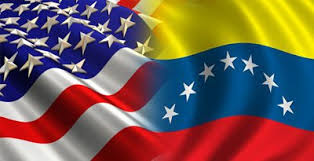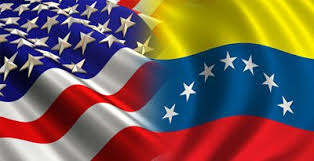
This week, the already strained relationship between Venezuela and the United States, got worse.
Saying he oversaw or "partially owned" narcotics shipments of more than 1,000 kilograms (2,204 pounds) from Venezuela, some of which ended up in Mexico and the U.S., the Treasury Department blacklisted Venezuelan Vice President Tareck El Aissami on Monday.
"On the one hand, it's a drop in the ocean, because it won't change what's happening on the ground," said Dany Bahar, fellow at Brookings. "On the other hand, it would represent a shift to a more realistic approach toward what's happening in Venezuela."
"By sanctioning the vice president, the U.S. government is acknowledging that the Venezuelan government has drug dealers at the highest ranks of government," he said.
The government had frozen "tens of millions of dollars" worth of assets belonging to El Aissami and Samark Jose Lopez Bello, El Aissami's primary frontman, said the newly minted Treasury Secretary Steve Mnuchin in a Tuesday news conference.
"Relations between the U.S. and Venezuela have been on ice," said Monica DeBolle, senior fellow at the Peterson Institute for International Economics. "For now, this will keep those relations on ice."
In the late 1990s the communist authoritarian Hugo Chavez became president which sparked off a deterioration of Venezuela's relationship with the U.S. which has been hostile since that time. Venezuela's descent into economic chaos was blamed on President Barack Obama by Maduro, a former bus driver, who succeeded Chavez following his death in 2013.
How the relationship between the countries evolves under President Donald Trump is being tested by the new sanctions. Since his election, Maduro has treaded carefully with Trump.
While later claiming that Trump "won’t be worse than Obama”, Maduro had blasted the Republican as a "thief" and "bandit" during the U.S. election campaign.
"The situation in Venezuela is now unraveling very fast. It's going to implode. The one thing that puzzles people is that it's taking this long."-Monica DeBolle, senior fellow, Peterson Institute for International Economics
As Venezuela deals with a massive shortage of basic goods and a spiraling economy, the Treasury's decision to sanction El Aissami could not have come at a worse time.
While Venezuela's violent crime rate is one of the worst on earth, its inflation rate last year reached a staggering 800 percent.
"There is a big lack of food and medicine in Venezuela," said Brookings' Bahar. "People are dying from very curable illnesses."
A massive drop in crude oil prices, Venezuela's main export, has accentuated the country's economic troubles. Despite a sharp rebound from their 2016 lows, U.S. crude prices have fallen more than 40 percent since October 2014.
While potentially serving as a wake-up call for Colombia and Brazil, the United States' decision to sanction Venezuela's El Aissami may further erode relations between the two nations, it may also serve as a wake-up call for Colombia and Brazil.
Colombia and Brazil would be pressurised to increase security along their respective borders with Venezuela by the sanctions, Peterson's DeBolle said. "I think that may have been the intended impact from this," she said of the new U.S. sanctions, adding that Brazil and Colombia are close allies with the U.S.
While the Venezuelan-Brazilian border is notorious for drug trafficking, thousands of Venezuelans have crossed the border into Colombia, looking for food and medicine.
"The Brazilian government has been very reluctant in taking a strong stance against Venezuela because that's just how they operate," said DeBolle. "Venezuela is a key point of instability in the region. At some point, countries there will have to come together to find a solution."
(Source:www.cnbc.com)
Saying he oversaw or "partially owned" narcotics shipments of more than 1,000 kilograms (2,204 pounds) from Venezuela, some of which ended up in Mexico and the U.S., the Treasury Department blacklisted Venezuelan Vice President Tareck El Aissami on Monday.
"On the one hand, it's a drop in the ocean, because it won't change what's happening on the ground," said Dany Bahar, fellow at Brookings. "On the other hand, it would represent a shift to a more realistic approach toward what's happening in Venezuela."
"By sanctioning the vice president, the U.S. government is acknowledging that the Venezuelan government has drug dealers at the highest ranks of government," he said.
The government had frozen "tens of millions of dollars" worth of assets belonging to El Aissami and Samark Jose Lopez Bello, El Aissami's primary frontman, said the newly minted Treasury Secretary Steve Mnuchin in a Tuesday news conference.
"Relations between the U.S. and Venezuela have been on ice," said Monica DeBolle, senior fellow at the Peterson Institute for International Economics. "For now, this will keep those relations on ice."
In the late 1990s the communist authoritarian Hugo Chavez became president which sparked off a deterioration of Venezuela's relationship with the U.S. which has been hostile since that time. Venezuela's descent into economic chaos was blamed on President Barack Obama by Maduro, a former bus driver, who succeeded Chavez following his death in 2013.
How the relationship between the countries evolves under President Donald Trump is being tested by the new sanctions. Since his election, Maduro has treaded carefully with Trump.
While later claiming that Trump "won’t be worse than Obama”, Maduro had blasted the Republican as a "thief" and "bandit" during the U.S. election campaign.
"The situation in Venezuela is now unraveling very fast. It's going to implode. The one thing that puzzles people is that it's taking this long."-Monica DeBolle, senior fellow, Peterson Institute for International Economics
As Venezuela deals with a massive shortage of basic goods and a spiraling economy, the Treasury's decision to sanction El Aissami could not have come at a worse time.
While Venezuela's violent crime rate is one of the worst on earth, its inflation rate last year reached a staggering 800 percent.
"There is a big lack of food and medicine in Venezuela," said Brookings' Bahar. "People are dying from very curable illnesses."
A massive drop in crude oil prices, Venezuela's main export, has accentuated the country's economic troubles. Despite a sharp rebound from their 2016 lows, U.S. crude prices have fallen more than 40 percent since October 2014.
While potentially serving as a wake-up call for Colombia and Brazil, the United States' decision to sanction Venezuela's El Aissami may further erode relations between the two nations, it may also serve as a wake-up call for Colombia and Brazil.
Colombia and Brazil would be pressurised to increase security along their respective borders with Venezuela by the sanctions, Peterson's DeBolle said. "I think that may have been the intended impact from this," she said of the new U.S. sanctions, adding that Brazil and Colombia are close allies with the U.S.
While the Venezuelan-Brazilian border is notorious for drug trafficking, thousands of Venezuelans have crossed the border into Colombia, looking for food and medicine.
"The Brazilian government has been very reluctant in taking a strong stance against Venezuela because that's just how they operate," said DeBolle. "Venezuela is a key point of instability in the region. At some point, countries there will have to come together to find a solution."
(Source:www.cnbc.com)





